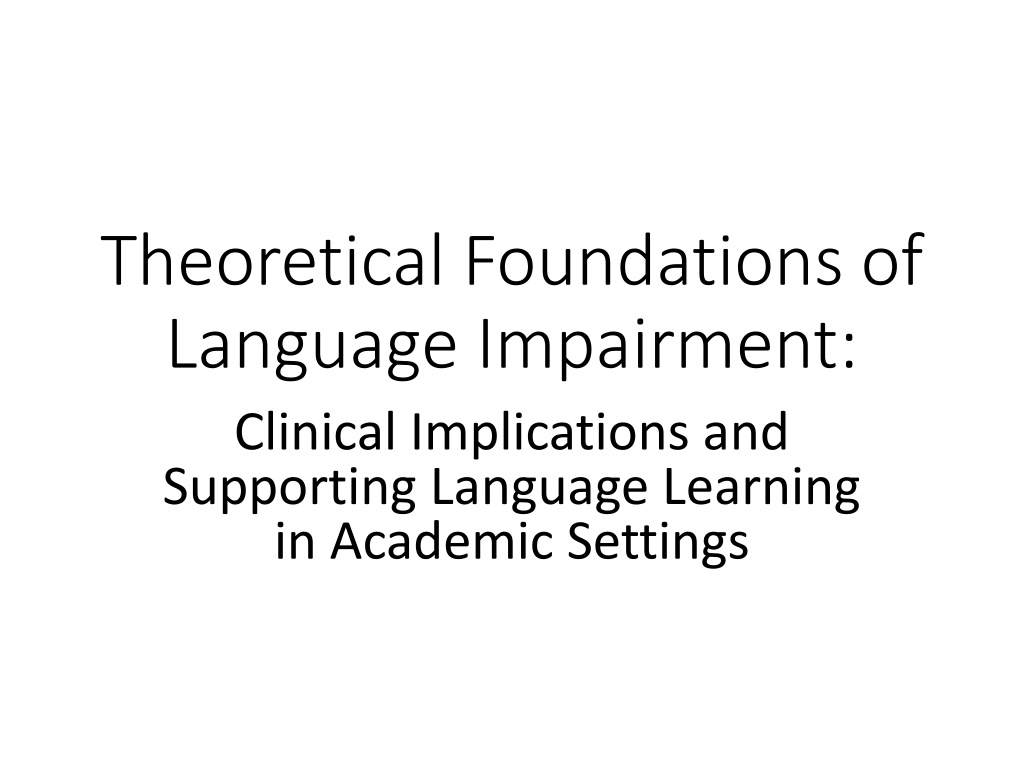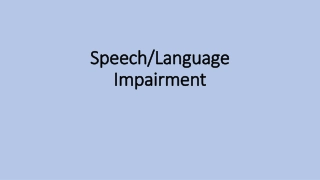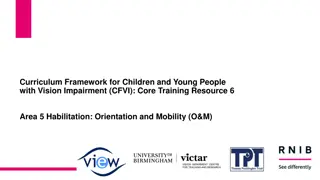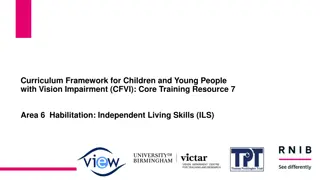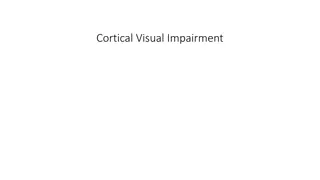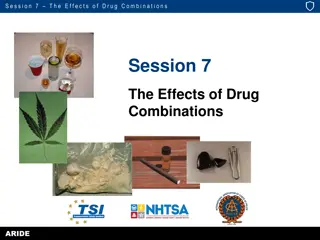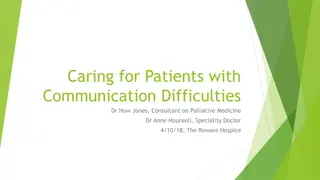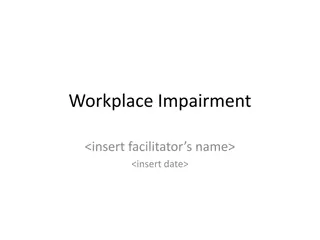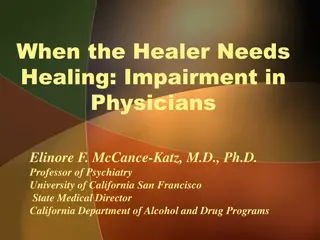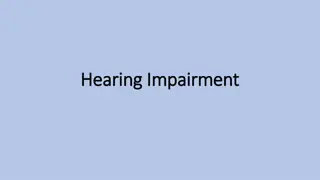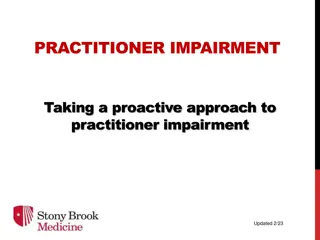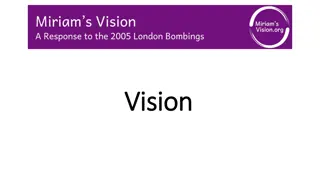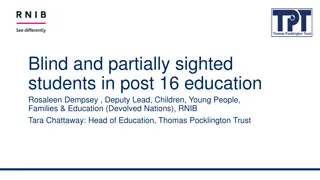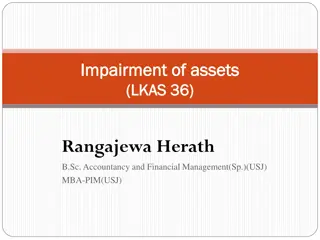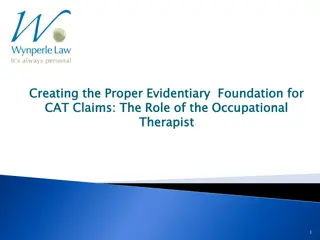Understanding Language Impairment: Clinical Insights and Academic Support
Delve into the theoretical foundations of language impairment, exploring clinical implications and strategies for supporting language learning in academic settings. The PowerPoint outline covers intervention techniques, dynamic assessment, systematic learning supports, and fostering a growth mindset. Learn about the Cone of Language Learning, hierarchical skill interventions, and the importance of effective communication for productive and happy living.
Uploaded on Oct 05, 2024 | 0 Views
Download Presentation

Please find below an Image/Link to download the presentation.
The content on the website is provided AS IS for your information and personal use only. It may not be sold, licensed, or shared on other websites without obtaining consent from the author. Download presentation by click this link. If you encounter any issues during the download, it is possible that the publisher has removed the file from their server.
E N D
Presentation Transcript
Theoretical Foundations of Language Impairment: Clinical Implications and Supporting Language Learning in Academic Settings
For test 2 In chapter 2, you only need to read pp. 41-52 Stop at the bottom of p. 52
PowerPoint Outline** I. Introduction II. Intervention: Playing the Game III. Dynamic Assessment (review CSAD 143) IV. Systematic Learning Supports V. Developing a Growth Mindset
I. INTRODUCTION: The Cone of Language Learning Literacy Oral language Attention, memory Sensory Processing Medical/physical
** If we focus on fixing the problem at the source or base of the cone, then when that problem is fixed, the impact of these interventions spreads upward Medical problems are not within our scope, but we can indirectly refer (e.g., for PE tubes, needed surgery, glasses, etc.)
II. INTERVENTION: PLAYING THE GAME** In basketball, you have a series of tasks (run, dribble, shoot) The end goal is to play the game well Language is the same way there are skills and strategies, but the end goal is effective communication in social and academic settings and living a productive and happy life
In the old days, you had 2 boxes:** Behaviorist drill and kill, discrete trials, no context, lots of flashcards Whole language immerse children in rich literature, but no direct teaching of skills http://www.ikea.com/us/en/images/products/drona-box-yellow__0311971_PE429574_S4.JPG
Hierarchical Skill Intervention http://www.how-to-draw-funny-cartoons.com/image-files/cartoon-ladder-5.gif Past -ed Plural -s -ing
Celeste Roseberry youtube channel Using Drill to Improve Sight Word Recognition
Often, drill requires the child to imitate the SLP through use of elicited imitation:** SLP: Say I see the boy petting the cat. Child: I see the boy petting the cat. For years, we thought that was sufficient, but new research proves that there is more to it
Eisenberg et al. (2020). Use of imitation training** for targeting grammar: A narrative review. Language, Speech, and Hearing Services in Schools, 51, 205-225. A meta analysis of 21 studies showed: elicited imitation was more effective than modeling in teaching new concepts to children with LI But, there was less carryover to conversational speech children just increased accuracy in drill contexts
Eisenberg et al. 2020 recommended:
. Contextualized Skill Intervention** Tx goals are explicitly addressed and also embedded in communicative contexts Goal: mix drill on explicit skills with whole activities such as a story, thematic unit (like Native American/First People tribes), and other classroom curriculum
RISE:** Repeated opportunities in an intense schedule with systematic support of explicit learning goals Active engagement + multiple exposures = success! Involves mixing whole and part activities along the way
Ukrainetz recommends combining drill and whole context learning for example:** SLP drills on irregular plural cards (this is one mouse these are 2____) (drill/parts) Play a game of Go Fish with the cards (whole) Child drills SLP with cards and tries to catch SLP doing them incorrectly (drill/parts) Write/tell a story with the cards (whole)
4th grade science: recycling lesson** Here are the vocabulary words you will use to work on plural s: Wastes, pollutants, plastics, amounts, habitats, beaches On an index card, pick one of the words above and write how you will work on it in therapy using this paradigm: 1. parts 2. whole 3. parts 4. whole
For example, with the word beaches ** 1. Part have the child repeat these words after me: beaches, shells, grains of sand, rocks, waves (drill) 2. Whole Draw a picture that has all these objects and discuss the picture 3. Part Have the child create sentences using each word (e.g., The shells are pretty.) [drill] 4. Whole Watch a youtube video about conserving our beaches and discuss it afterwards, using the plural s correctly
IV. SYSTEMATIC LEARNING SUPPORTS** A. Structural Learning Support Simplify learning activities Make sure environment is not distracting Use oral and print lang to support each other
2. Regulatory scaffolds** Help student become a better learner Include developing sustained attention, helping student manage challenges
Regulatory scaffolds can include growth mindset work** This is based on the research of Carol Dweck at Stanford I have been using it very effectively for the last few years with ages 3-20
V. DEVELOPING A GROWTH MINDSET(regulatory scaffolds)
When children are little:** High levels of warmth and nurturance from caregivers promote bonding, attachment, and a secure foundation However, when children reach early adolescence, motivated by a very different kind of nurturance being challenged to work hard and improve themselves a growth mindset
The research of Carol Dweck** Divided people: 1) fixed mindset (FM), 2) growth mindset (GM) FM: intelligence, other skills are inborn and static--not amenable to change
Those with a growth mindset** Believe that intelligence and overall skills can be improved with hard work Students who believe that they can improve their intelligence and overall performance are more academically successful than those with a fixed mindset
We have believed for years in a fixed brain,** or that we are born with a certain fixed amount of innate intelligence Recent findings in neuroscience and cognitive psychology show: the brain has a great deal of plasticity and can be taught, even into older age (I love the story of a student s grandma, who began studying Spanish when she was 80!)
In Dwecksresearch** Conducted a study with low-SES 7th graders in Texas. Over the school year, each student in the study worked with a college student mentor Students in the control group heard standard messages about how drugs could interfere with academic achievement
Again, the experimental students heard that:** The brain is like a muscle-- grows stronger with use Every time you stretch yourself and learn something new, brain forms new connections
In other words** Experimental group heard: intelligence is not fixed it s malleable, can be with hard work, grit, and perseverance Good study habits were also taught
The researchers reported that:** The image of new connections forming proved extremely motivating to the students in the pilot studies They reported that as they paid attention in class or studied difficult material, they pictured their neurons growing new connections; and that when they considered not studying, they warned themselves that they would be missing a chance to form new connections
Students were taught that:** The brain grows new connections every time we face challenges and learn, and that great mathematicians and scientists are people who have engaged in this process more than other people
We can also explain that its like trees growing out to touch each other**
At the end of the year, Dweck et al compared the 2 groups scores on Texas standardized achievement tests:
The researchers concluded:** It is important, particularly if this era of high stakes testing continues, for students to understand that these tests assess current skills and not long-term potential to learn This is critical since many students make take their disappointing achievement test scores as a measure of their fixed, underlying ability and become discouraged about their academic futures
Interestingly, the researchers also found that:** Students with a fixed mindset are threatened by challenges, effort, and mistakes--these are things threaten to reveal the limits of students ability We portray effortless achievement as the sign of true talent. Many bright students, praised for their easy successes, may believe that they are gifted only when things come easily to them.
We can help students by** Teaching them about the new science of brain plasticity and the new view of talent and giftedness as dynamic attributes that can be developed. Too often, the brain is believed to be static, and talent and giftedness are seen as permanent, unchanging personal attributes that automatically bring later success
**Our research (Cimpian, Arce, Markman, & Dweck, 2007; Kamins & Dweck, 1999; Mueller & Dweck, 1998) has shown that giving students praise for their intelligence, as opposed to praise for process (such as effort or strategy) makes students think that their abilities are fixed, makes them avoid challenging tasks (so they can keep on looking intelligent), makes them lose confidence and motivation when the task be-comes hard, impairs their performance on and after difficult problems, and leads them to lie about their scores afterwards.
On the other hand.** Process praise (e.g., for effort or strategy) leads students to seek and thrive on challenges.
**Process praise contributes to much better outcomes than intelligence or product praise You are such a hard worker. I m really excited about how you re stretching yourself now and working to learn hard things. It may take more time for you to catch on to this and be comfortable with this material, but you if you keep at it like this you will.
Examples of what to say:** Let s go around and have each of you share something hard you learned today that you didn t know before. Who had a good struggle? Let s share what we struggled with today Get ready for a terrific struggle! Are you ready? Here we go. That was a lot of hard work. Can you just imagine all the connections you grew today? Who thinks they made a really interesting mistake? Who else made a terrific mistake that will help us learn?
Me with a defiant (and huge!) 15-year old with Fetal Alcohol Syndrome and a history of violence:** Dr. R.: Kiree, I want you to do 50 productions of sentences with slow, careful speech. Kiree: No way. I can t. Dr. R.:(after the hour was up): Just so you know, you did 120 good productions. You didn t even think you could do 50! Look at you!
